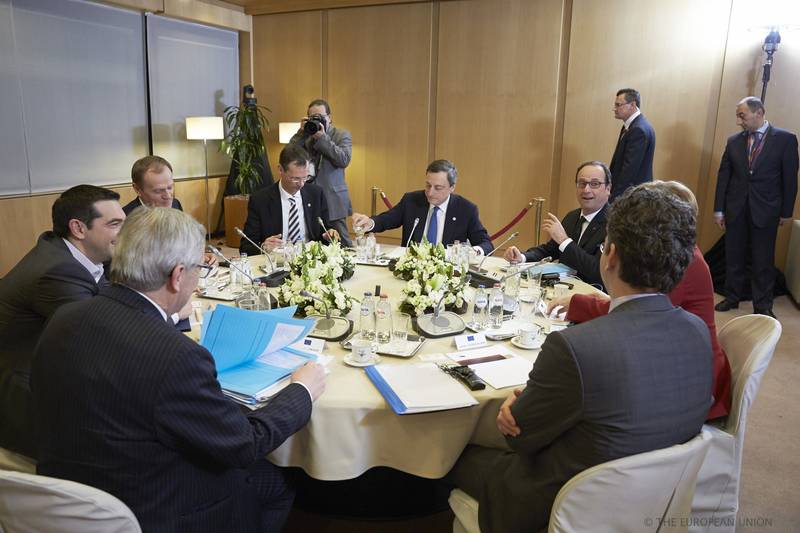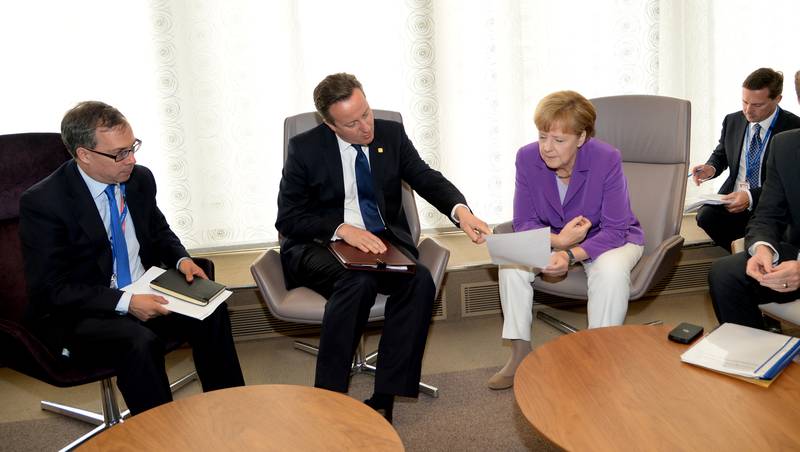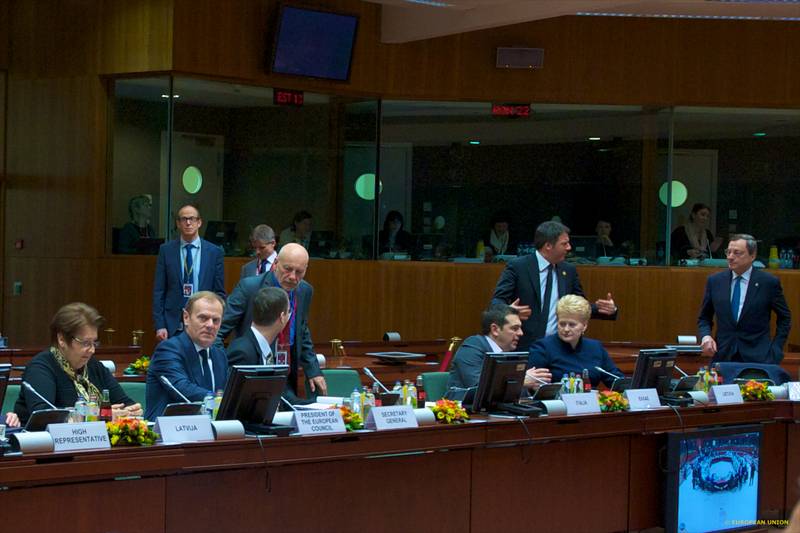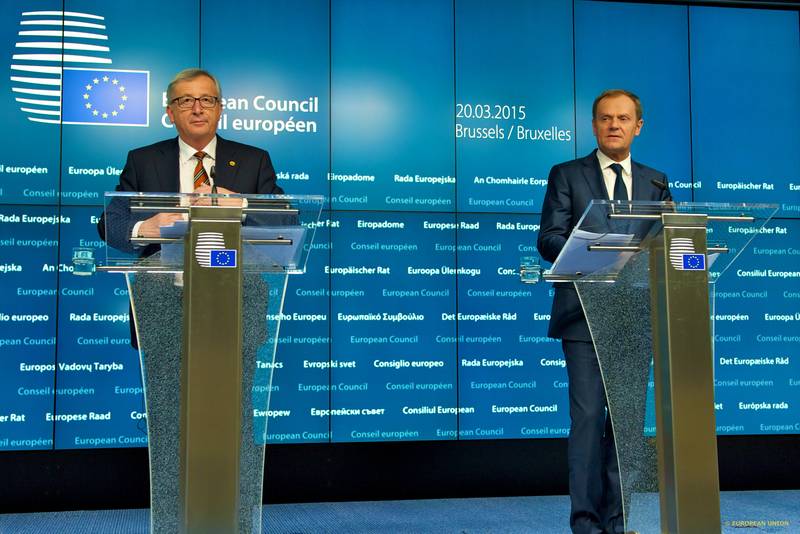Greece Crisis Endangers Euro Area's Political Integrity
Adelina Marini, March 28, 2015
 During the crisis, which broke in 2009 and whose beginning was marked by Greece, a major issue was to keep the integrity of the EU and the equality between the euro area member states and those outside the currency block. A huge merit for this had the then prime minister of Poland, Donald Tusk, who is now president of the European Council. During its presidency Poland invested exceptional efforts to avoid the creation of a two-speed Europe - one faster integrationist speed and one much slower and, possibly, not one way speed for the others. But now, the renewed crisis with Greece, provoked by the electoral victory of a strongly populist party in the country, the political integrity of the euro area and the EU is again put to the test.
During the crisis, which broke in 2009 and whose beginning was marked by Greece, a major issue was to keep the integrity of the EU and the equality between the euro area member states and those outside the currency block. A huge merit for this had the then prime minister of Poland, Donald Tusk, who is now president of the European Council. During its presidency Poland invested exceptional efforts to avoid the creation of a two-speed Europe - one faster integrationist speed and one much slower and, possibly, not one way speed for the others. But now, the renewed crisis with Greece, provoked by the electoral victory of a strongly populist party in the country, the political integrity of the euro area and the EU is again put to the test.
The new signs of division have appeared during the spring EU summit on 19-20 March after the mini summit on Greece was announced, attended only by German Chancellor Angela Merkel, French President Francois Hollande and Greece's Prime Minister Alexis Tsipras. The summit was also attended by the chiefs of the European Commission, European Council and the Eurogroup - Jean-Claude Juncker, Donald Tusk and Jeroen Dijsselbloem. This caused discontent with several member states, Bulgaria including (although it is not part of the eurozone), and again begged the question how unified the EU really is when it comes to making such important decisions. First spoke against this Charles Michel, the prime minister of Belgium, who tweeted that the Belgian government had not given a mandate to the leaders of Germany and France to negotiate on its behalf with Greece.
According to Mr Michel, Greece's problems are not only Greek, they affect the entire euro area. Boyko Borissov, the premier of Bulgaria, said responding to a question by euinside, that he was among those who expressed discontent with the mini summit which lasted until the early hours of Friday (20 March). Bulgaria is directly interested in knowing what is going on with Greece and wants to participate in the decision-making process for Greece. More than 30% of the banking sector in Bulgaria is controlled by Greek banks, he said. "Practically, they gathered, decided something. Let's say, this is okay this time, but we learn these things from the news", Mr Borissov added. The meeting was heavily criticised in the European Parliament as well during the mini plenary session in Brussels this week. On 25 March Jean-Claude Juncker and Donald Tusk reported to the MEPs on the outcome of the spring summit but they were severely criticised by some influential MEPs.
Yet in his introduction, Donald Tusk explained that the informal mini summit was requested by Tsipras and the format was the result of the refusal of the leaders to hold a separate euro area summit. The European Commission chief also confirmed that the leaders did not want the issue of Greece to be put on the agenda of the European Council. According to the leader of the group of the European Conservatives and Reformists (ECR), Syed Kamall (UK), the Council is obviously avoiding to discuss the hottest issues on the public agenda and asked what was the point then to hold such meetings. He urged Donald Tusk to do whatever is necessary to ensure that the tough issues on the euro would not be avoided during summits. Guy Verhofstadt, leader of the liberal group (Belgium), said that it is absolutely unacceptable to hold such a mini summit. "I deplore fully that you have organised a meeting on Greece in a limited format. What type of Union is this?", he asked and added that such meetings are against the Union's and the euro area's interests for which he was applauded in the room.
This opinion was not shared by Rebecca Harms (Germany) from the Greens/European Free Alliance group, because, she said, such meetings actually reduce the pressure and the possibility of Greece leaving the euro area, the so called grexit. Donald Tusk defended his decision saying that the informal summits are not his invention but a very frequent practise. Moreover, he said, the leaders of the euro area countries not only insisted but even begged a special euro area summit not to be held to avoid the risk of a confrontation at the highest political level.
Greece and EU - lost in agreements
The mini summit started late in the evening on Thursday (19 March) after the official programme of the day for the spring European Council had ended where a major topic was the energy union. The mini summit ended almost three hours after midnight (CET). It was requested by the Greek prime minister with the aim to try and secure the payment of part of the remaining tranches of the loan under the second bailout programme because the government is expected to be out of money (according to some assessments even in the end of this month). After three hours of negotiations it became clear that there will be no concessions. Greece has to present a clear reforms plan with clear deadlines for implementation and only then the allocation of the remaining tranches can be discussed. After the end of the mini summit a statement by the whole Eurogroup was released which pointed out that the agreement reached on 20 February is still in force and that the Greek authorities will have full control over the reforms a detailed list of which has to be presented in the coming days.
After another series of different interpretations of the outcome of the mini summit, Mr Tsipras promised that a list of reforms will be sent by Monday. As part of the totally different media and statehood behaviour, which constantly evokes associations with the movie "Lost in translation", the tensions between Greeks and Germans strongly increased also as a result of the controversy whether the Greek finance minister, Yanis Varoufakis, really showed the finger to the Germans during a lecture at a forum in Zagreb in 2013. As if to insert additional drama, Mr Varoufakis published (also on 20 March) a short blog post titled symbolically "Of Greeks and Germans" in analogy with John Steinbeck's novel "Of Mice and Men". In it, he urges the finger-pointing and blame game to stop, which obviously includes Alexis Tsipras's demand Germany to pay reparations to Greece for what it did during World War II.
And although he calls mutual accusations to stop, Yanis Varoufakis's blog post starts with an explanation why he was against new loans for Greece in 2010. Even then it was clear, he writes, that this was not a bailout plan for Greece but "a cynical transfer of losses from the books of the private banks to the weak shoulders of the weakest of Greek citizens. (How many of Europe’s taxpayers, who footed these loans, know that more than 90% of the €240 billion borrowed by Greece went to financial institutions, not to the Greek state or its citizens?)", Varoufakis asks. He proposes all parties to focus on their common interest, which is to find a way for fast growth and reform of Greece. He confirmed that the 20 February agreement is an excellent opportunity for this. "Let us implement it immediately", he urged. It is unclear, however, why is he urging for this on 20 March since the agreement was agreed a month earlier.
A dangerous format
The Greek crisis will obviously continue to focus EU's attention, but this should not cast a shadow on the newly emerging problem with the decision-making on important issues at EU level. The bilateral cooperation of France and Germany is not new and, indeed, it has always been viewed positively inside and outside the EU. Moreover, when Francois Hollande was elected president a majority of analysts were concerned about the health and solidity of the Franc-German EU motor. With time, however, the balance between the symbolism and what is acceptable has grown thinner. France and Germany participated as a pair in the negotiations on the peace agreement between Ukraine and Russia in Minsk, for which there is also no official mandate from the other EU member states. And although no one complained publicly, this seriously undermines the ambitions for a common foreign policy of the Union and the Union itself by questioning the equality among the member states which regularly discuss their positions on the eastern conflict and the relations with Russia at each summit in the past year.
The spring summit is not an exception. EU is facing severe challenges for its stability. On the one hand Russia is acting subversively by investing in any means to break the unity in the foreign and energy policies. On the other hand the growing influence of eurosceptic parties for some of which was published information that they are funded by the Kremlin, is also a great threat for the European unity. And the situation in Greece has already turned the eastern European members against new concessions for Greece because no one did this for them when they were making the difficult transition from a communist system to a liberal democratic one. Many of them paid a heavy economic and social price for this transition. That is why, they are not inclined more concessions to be done for Greece. Some, like the Baltic states, made really super efforts not only to complete that transition but also to join the euro area during the crisis. Their discontent from their opinion not being taken into account should not be underestimated.
It is true that the mini summit with Tsipras was attended by all the institutional chiefs, but contrary to the popular clichй not the European Commission but the European Council is the EU's government. It is this body that makes and applies the important decisions on the future of the Union. That is why, it is very important to avoid the creation of a two-tier decision-making system.
 David Cameron, Angela Merkel | © Council of the EU
David Cameron, Angela Merkel | © Council of the EU | © Council of the EU
| © Council of the EU Jean-Claude Juncker, Donald Tusk | © Council of the EU
Jean-Claude Juncker, Donald Tusk | © Council of the EU